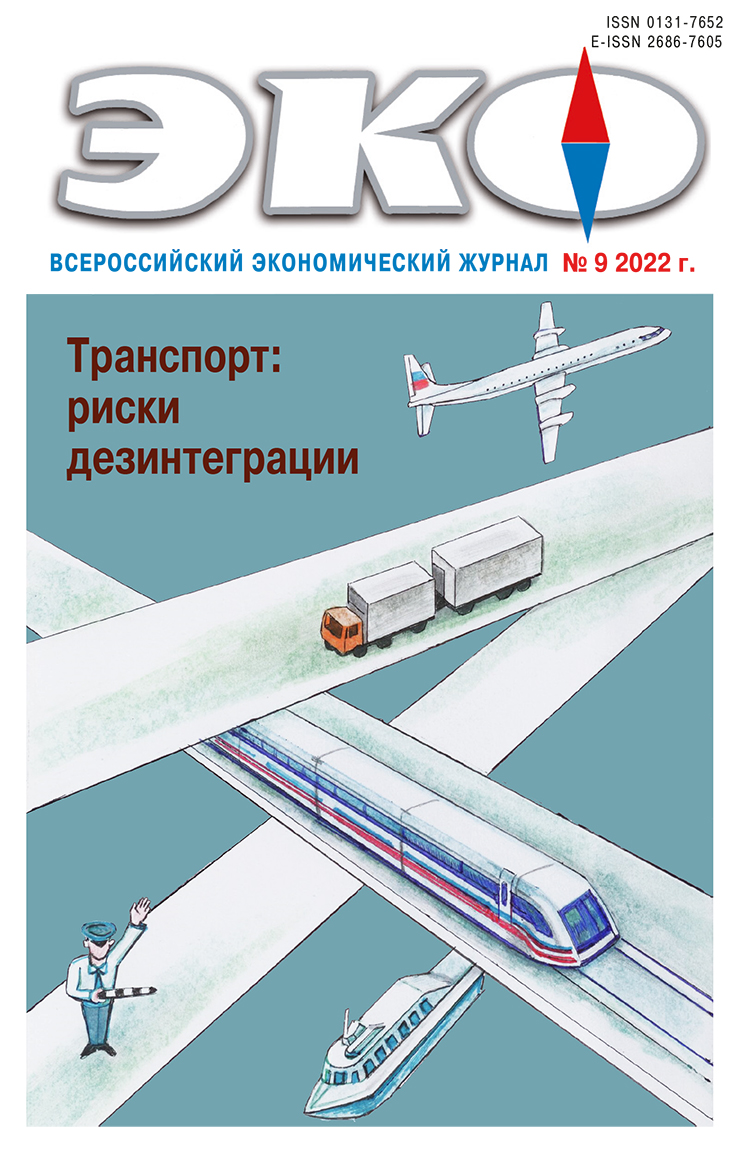Management
Strategy to Expand the Innovation Ecosystem of the Enterprise in the Context of Business Diversification
Published 2022-08-30
Keywords
- innovations; ecosystem economics; stakeholders; ecosystem management; inter-firm interactions
How to Cite
1.
Popov Е, Simonova В, Chelak И. Strategy to Expand the Innovation Ecosystem of the Enterprise in the Context of Business Diversification. ECO [Internet]. 2022 Aug. 30 [cited 2026 Feb. 21];52(9):96-112. Available from: https://ecotrends.ru/index.php/eco/article/view/4507
Abstract
The development of digital platform ecosystems in recent years has somewhat shaded the growth possibilities of industrial enterprise ecosystems. However, the ecosystem theory in economics and management gives us a fruitful methodological approach to a comprehensive analysis of relationships at the micro level as well – to represent the totality of the interrelationships of the enterprise ecosystem core with all with stakeholders. Based on the results of testing the original technology of ecosystem management, the authors formulate proposals for the dissemination of appropriate tools in the processes of functioning and diversification of industrial enterprises. The theory of inter-firm interactions allows to detail the issues of interrelations within the innovation ecosystem, to apply the principles of ecosystem management to separate parts of the considered community of interested parties.References
- Кирдина-Чэндлер С.Г., Маевский В. И. Методологические вопросы анализа мезоуровня в экономике // Журнал институциональных исследований. 2017. Т. 9. № 3. С. 7–23.
- Лебедев Ю. В. Теоретические основы экологически устойчивого развития территорий: патриотический взгляд: монография. Екатеринбург: Изд-во УГГУ, 2015. 156 с.
- Логинов М. П., Усова Н. В. Формирование и развитие потенциала рынка цифровых услуг // e-FORUM. 2020. № 2(11). С. 154–163.
- Овчинникова А. В., Зимин С. Д. Оценка связей предпринимательских экосистем с уровнем экономического развития регионов России // Journal of Applied Economic Research. 2021. Т. 20. № 3. С. 362–382. DOI: 10.15826/vestnik.2021.20.3.015
- Паскевская В. Н. Роль ESG-факторов в минимизации рисков стратегического развития предприятий индустрии медицинских изделий // Инновации и инвестиции. 2021. № 8. С. 186–189.
- Попов Е. В., Симонова В. Л., Челак И. П. Методика управления развитием инновационной экосистемы // Проблемы теории и практики управления. 2022. № 1. С. 81–96.
- Попов Е. В., Симонова В. Л., Челак И. П. Систематизация факторов развития инновационной экосистемы предприятия // Вопросы управления. 2021. № 4. С. 151–165.
- Alaimo, C., Kallinikos, J., Vallderama-Venegas, E. (2020). Platforms as service ecosystems: lessons from social media. Journal of Information Technology. Vol. 35. Issue 1. Pp. 25–48. https://doi.org/10.1177/0268396219881462
- Ciasullo, M.V., Troisi, O., Grimaldi, M., Leone, D. (2020). Multi-level governance for sustainable innovation in smart communities: an ecosystems approach. International Entrepreneurship and Management Journal (Springer). Vol. 16 (4). Pp. 1167–1195.
- Corradini, C. (2022). Social trust and new firm formation: a regional perspective. Small Business Economics (Springer, Social). Vol. 58 (1). Pp. 169–184.
- Dufva, M., Koivisto, R., Ilmola-Sheppard, L., Junno, S. (2017). Anticipating Alternative Futures for the Platform Economy. Technology Innovation Management Review. Vol. 7(9). Pp. 6–16. http://doi.org/10.22215/timreview/1102
- Fang, T.P., Wu, A., Clough, D.R. (2021). Platform Diffusion at Temporary Gatherings: Social Coordination and Ecosystem Emergence. Strategic Management Journal. Vol. 42. No. 2. Pp. 233–272.
- Gifford, E., McKelvey, M., Saemundsson, R. (2021). The evolution of knowledge-intensive innovation ecosystems: coevolving entrepreneurial activity and innovation policy in the West Swedish maritime system. Industry and Innovation. 28:5. Pp. 651–676. DOI: 10.1080/13662716.2020.1856047
- Horváth, K. (2021). Az innovációs ökoszisztéma menedzsment strukturális kihívásai – a szakirodalom tükrében. Management & Marketing. Vol. 55(3). Pp. 71–81. DOI: 10.15170/MM.2021.55.03.06
- Jacobides, M.G., Cennamo, C., Gawer, A. (2018). Towards a theory of ecosystems. Strategic Management Journal. No. 39. Pp. 2255–2276.
- Jumasseitova, A.K., Potluri, R.M. (2020). An Exploratory Research on Entrepreneurial Ecosystems: Effects on Economic Integration. Journal of Asian Finance, Economics and Business. Vol. 7. No. 8. Pp. 661–670.
- Kohtamäki, M., Parida, V., Oghazi, P., Gebauer, H., Baines, T. (2019). Digital servitization business models in ecosystems: A theory of the firm. Journal of Business Research. Vol. 104. November. Pp. 380–392.
- Kuhn, M.-L., Viviers, W., Sewdass, N., Calof, J. (2020). The Business Anticipatory Ecosystem outside the «First World»: Competitive Intelligence in South Africa. Foresight and STI Governance. Vol. 14. No. 3. Pp. 72–87. DOI: 10.17323/2500–2597.2020.3.72.87
- Mickiewicz, T., Rebmann, A. (2020). Entrepreneurship as Trust. Foundations and Trends in Entrepreneurship. Vol. 16. No. 3. Pp. 244–309. http://dx.doi.org/10.1561/0300000088
- Paridaa, V., Burströmc, T., Visnjicd, I., Wincenta, J. (2019). Orchestrating industrial ecosystem in circular economy: A two-stage transformation model for large manufacturing companies. Journal of Business Research. Vol. 101. August. Pp. 715–725.
- Penttilä, K.R., Ravald, A., Dahl, J., Björk, P. (2020). Managerial sensemaking in a transforming business ecosystem: Conditioning forces, moderating frames, and strategizing options. Industrial Marketing Management. Vol. 91. November. Pp. 209–222.
- Sharma, P. (2020). Open Digital Ecosystems: The Turn of The State! Forbes India Edition. Sept 11. Pр. 1–6.
- Shipilov, A., Gawer, A. (2020). Integrating research on interorganizational networks and ecosystems. Academy of Management Annals. Vol. 14. No. 1. Pp. 92–121. https://doi.org/10.5465/annals.2018.0121
- Siuskaite, D., Pilinkiene, V., Zvirdauskas, D. (2019). The Conceptualization of the Sharing Economy as a Business Model. Inzinerine Ekonomika-Engineering Economics. No. 30 (3). Pp. 373–381.
- Visscher, K., Hahn, K., Konrad, K. (2021). Innovation Ecosystem Strategies of Industrial Firms: A Multilayered Approach to Alignment and Strategic Positioning. Creativity and Innovation Management. Vol. 30 (1). Pp. 1–13. DOI: 10.1111/caim.12429
- Wirtz, J., So, K.K., Mody, M., Liu, S.Q., Chun, H.H. (2019). Platforms in the peer-to-peer sharing economy. Journal of Service Management. Vol. 30–4. Pp. 452–483. DOI:10.1108/josm-11–2018–0369

